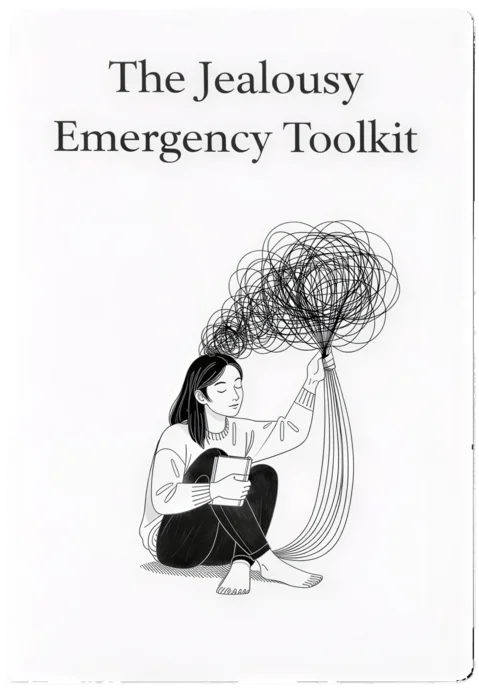The nightmare scenario in open relationships: your partner develops real feelings for someone else.
Your partner comes home glowing after a date. They can't stop talking about this person. How funny they are. How easy the conversation felt. And suddenly your chest tightens. You start calculating: do they talk about me like this?
The panic that floods your system when you imagine your partner developing feelings for someone else? That's primal. That's your brain screaming about abandonment and loss and being replaced. It whispers terrible things: they'll find someone better, someone more exciting, someone who they'd rather be with.
You start playing out scenarios. They'll want to spend more time with this new person. Date nights will get rescheduled. Before you know it, you're at the end of a mental movie where you're helping them pack boxes while they move in with their new love.
But here's what's actually happening.
Table of Contents
The Real Threat
The threat isn't the other person. I know it feels like it is. It feels like this mysterious someone else could ruin everything you've built.
But what's really happening is projection. Your fears are writing horror stories about your own inadequacy. The voice in your head isn't worried about them—it's worried about you. Am I enough? Will I be enough?
Those fears come from insecurity. From old wounds. From every rom-com that taught you there's "the one" and everyone else is just a placeholder.
The other person isn't the threat. Your unresolved fear of not being worthy of love is the threat.
Recognizing that your fear is internal doesn't make it hurt less. But it does shift where you need to focus your energy. You can't control who your partner meets or how they feel about them (given you are practicing ENM). You can work on why those feelings feel like a death sentence for you.
The Control Paradox
When fear takes over, what do you do? You add rules. More check-ins. Shorter time limits. You need to know where they are, who they're with, what they're doing. You restrict and monitor.
But ask yourself: Does that make them love you more? Or does it make them want to run?
Picture yourself being constantly interrogated. Your partner makes you feel guilty for enjoying yourself. They track your every move like you're a teenager who missed curfew.
Would you feel loved? Or would you feel like a prisoner?
Here's the uncomfortable truth: you cannot force someone to love you. You can't force them to stay.
You can manipulate, guilt trip, and restrict all you want, but if someone wants to leave, they'll leave. And if they stay out of obligation rather than genuine desire? That's not really staying. That's just a slower way of leaving.
Do you see? Keeping your partner "by force" isn't actually keeping them at all.
The Freedom Switch
Now flip it around. What if instead of tightening your grip, you gave your partner freedom? What if you trusted them to make their own choices and trusted yourself to handle whatever happens?
Suddenly you're not the anxious, controlling partner who makes them feel trapped. You're the secure, confident person who enhances their life instead of restricting it.
And here's the paradox: that person? The one who gives freedom instead of demanding control? That's the person people don't want to leave.
When you're secure enough to let your partner explore and even develop feelings without losing your mind, you become incredibly attractive. Not because you're indifferent, but because you're strong enough to handle complexity. You're confident enough to know that their other connections don't diminish what you share.
The more freedom you give, the more you become someone worth choosing. The more you restrict, the more you become someone they need to escape from.
The thing you think will keep them close (control) is actually what pushes them away. And the thing you're terrified will lose them (freedom) is what makes them want to stay.
The "No Feelings" Trap
A lot of couples open up with this rule: physical stuff is fine, but no feelings allowed. Keep it casual. Don't catch feelings. Sounds safe. Controlled.
Except you can't legislate feelings. You can't choose not to like someone any more than you can choose to like someone. Feelings happen. Chemistry happens. Telling your partner "don't feel anything" is like telling them "don't think about elephants."
But more importantly, the "no feelings" rule isn't about feelings. It's about fear. It's code for "don't leave me."
What you're actually saying is: "I'm terrified that if you develop feelings for someone else, you won't want me anymore."
That fear is real. But trying to prevent feelings doesn't address the problem. It just creates a situation where your partner has to lie to you (or to themselves) about what they're experiencing. Now instead of navigating feelings together openly, you've built a relationship where honesty about emotions is literally against the rules.
You Want Real Connection
Think about it this way: when you're physically intimate with someone, do you want them to be an emotionless sex-robot? Just going through motions, and completely detached?
Of course not. You want someone who's present. Someone who feels something when they're with you. The connection is better when there's actual chemistry.
So why would it be different for your partner when they're with someone else?
If your partner is going to have experiences with other people (which is the point of opening up), would you really prefer they do it with people they feel nothing for? That's not hot. That's depressing.
Feelings make the experience better. A crush feels good. Genuine attraction feels good. These aren't threats unless your relationship is built on such shaky ground that any external affection could topple it.
What Actually Works
The alternative isn't to pretend feelings don't matter. It's to stop treating them like the enemy.
Feelings are information. When your partner develops a crush on someone, they should feel safe telling you about it. Not to rub your face in it, but because that's what's happening with them. And you should be able to hear it without spiraling, because you trust that a crush doesn't mean you're being replaced.
Here's what creates actual security:
Full trust and transparency. Your partner tells you the truth even when it's uncomfortable. You can say "I'm feeling insecure" without them getting defensive.
Respected boundaries. Not the "no feelings" kind, but real boundaries about time, communication, and what matters to each of you.
Active prioritization. Your primary relationship stays primary not through rules and restrictions, but through intentional effort from both of you.
Trust is built through small acts of respect and kindness, over and over again. Checking in before changing plans. Remembering that you're a priority even when they're excited about someone new. Noticing when you're quiet and asking what's really going on.
Both people have to show up for this. You can't demand trust while acting untrustworthy. You can't expect your partner to share their feelings if you punish them every time they're honest.
The Real Question
The question isn't "what if my partner falls in love with someone else?"
The real question is: "Do we have the kind of relationship where love expanding doesn't mean love disappearing?"
Because love isn't a finite resource. Your partner loving their parents doesn't mean they love you less. Having a best friend doesn't diminish their romantic feelings for you.
It only feels threatening if your relationship is built on scarcity and fear instead of abundance and trust.
Look, watching your partner light up about someone new can sting, especially at first. There will be moments of jealousy and insecurity. That's normal. The goal isn't to never feel those things. The goal is to feel them and work through them instead of letting them run the show.
Opening your relationship doesn't mean you stop feeling vulnerable. It means you choose to be vulnerable anyway. You choose to trust even when it's hard. You choose to believe that your partner can have feelings for someone else and still choose you.
The key is creating a relationship where feelings are welcomed, not weaponized. Where honesty is rewarded, not punished. Where your primary connection stays primary through genuine effort, not control.
Can your partner fall in love with someone else? Maybe. But if you've built something real, something based on genuine connection and mutual commitment: that doesn't have to be the end of your story.

